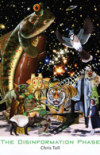The Disinformation Phase
In “Carbon-Based Lifeform Blues,” Chris Toll writes, “The job of poets is not to explain the Mystery. / The job of poets is to make the Mystery greater”—which is precisely what Toll accomplishes in his new collection of poems. The Disinformation Phase brings together 50 poems—including some “translations”—that, though economic in language, are wide in scope, expansive in imagination, and linguistically playful. Divided into three sections whose titles exemplify the playfulness (“The Ritual in Spiritual,” “The We in Weep,” and “The Ion in Redemption”), the book consists of short, concise poems where inanimate objects are capable of action and emotion, as seen in the opening poem, “Insulator Drive Blues”:
In “Carbon-Based Lifeform Blues,” Chris Toll writes, “The job of poets is not to explain the Mystery. / The job of poets is to make the Mystery greater”—which is precisely what Toll accomplishes in his new collection of poems. The Disinformation Phase brings together 50 poems—including some “translations”—that, though economic in language, are wide in scope, expansive in imagination, and linguistically playful. Divided into three sections whose titles exemplify the playfulness (“The Ritual in Spiritual,” “The We in Weep,” and “The Ion in Redemption”), the book consists of short, concise poems where inanimate objects are capable of action and emotion, as seen in the opening poem, “Insulator Drive Blues”:
A glacier
hotwires my supermarket
and leaves the city
in a hurry.
Good and evil
is an illusion.
My cathedral
blows its brains out
in the graveyard
behind a prison.
The struggle
is between light and dark.
My slaughterhouse
mixes a martini for the moon.
Be light.
In other poems, a meatpacking plant “trademarks its bad brainwaves,” a bookstore “wraps six kilos / in plastic,” an insane asylum “plays solitaire / all night long,” and “fluorescent lights march to their doom.” While many of the images are dark, there is a generosity and love here—a goal to “Be light,” as Toll instructs in the opening poem. It’s easy to imagine the author as a Whitman of sorts; he sees humanity everywhere and takes it all in: “Oh Haunted City, / I drink the light in every face.” In “Irregular Galaxy,” Toll writes, “A Big Voice pours through me”—and that voice contains multitudes.
Throughout the collection, Toll examines words, breaking them into pieces:
I’m the sin in singer.
Why is tiny in destiny?
I’m the cure in obscure.
Why is a trip in triple-crossed
and where am I going?
I’m the yes in yesterday.
Why isn’t destiny in clandestine?
(“Working for the Redshift (Peachpicker Blues)” )
In addition to these questions, a number of the poems play on familiar phrases and religious sayings. “Bless me, Monster, / for I am a hymn,” Toll writes in “Electricity Is My Friend,” and in “23 Palms,” “The Word is my shepherd. / I shall be wanted” (a few variations on this psalm show up throughout book). The reader will also encounter “translations” of poems by a time-traveling Emily Dickinson, Edgar Allen Poe, John Keats, and Sylvia Plath.
In “The Third Station of the Double-Crossed,” the speaker says, “My mission is so secret / I don’t know it myself”—if only everyone were on such missions. This is a brief collection, but one worth returning to regularly in order to be reminded that the world is a wondrous place. In The Disinformation Phase, Toll turns his attention to the mystery and amps it up.





